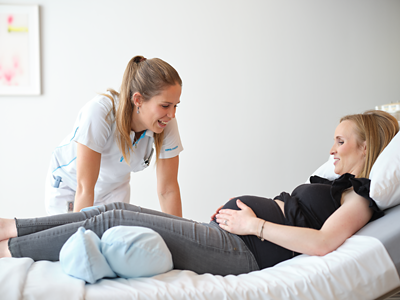The reasons for a late pregnancy differ from woman to woman. Nowadays, it is not uncommon for women to only start thinking about having children after the age of 30. The probability of becoming pregnant decreases with each passing year, and from the age of 35 onwards, we speak of a so-called high-risk pregnancy. The risk of a miscarriage or a changed number of chromosomes (e.g. trisomy 21) rises statistically for older pregnant women (slightly higher risk from the age of 30, much higher risk from the age of 40).
How likely am I to fall pregnant after the age of 35?
The biological clock is a fact of life. Statistically speaking, the probability of falling pregnant declines quite markedly with every year. However, the reasons for the decline in fertility as women grow older differ considerably.
Women are born with a limited number of egg cells. From their mid-30s, the number and quality of their egg cells drop sharply. The egg cells of older women can also not be fertilised as easily as those of younger women. On top of this, the menstruation cycle becomes less regular with age.
According to experts, women who decide to have their first child after the age of 30 often have to wait longer for a positive pregnancy test. The chance of falling pregnant at age 40 is only half of what it is at age 35. On average, a woman over the age of 35 takes 2 to 3 years to fall pregnant naturally if she has regular unprotected intercourse.
A fertility test can measure a woman’s fertility. It consists of a hormone analysis and an ultrasound examination. However, this test is not 100% reliable, as many factors can affect fertility.
What risks may arise?
Pregnancy at an advanced age, also called advanced maternal age pregnancy, is possible, but it also involves several risks.
- The probability of gestational diabetes is higher: It is crucial to strictly control your blood sugar levels with nutrition and physical exercise. Sometimes medication is also required. If not treated, gestational diabetes can cause the baby to grow much bigger, which increases the risk of birth-related injuries. Gestational diabetes can also increase the risk of premature birth, high blood pressure during pregnancy and complications for the child after it is born.
- High blood pressure: Research clearly indicates that the risk of developing high blood pressure during pregnancy is considerably greater for older women than for younger ones. Your doctor should carefully monitor your blood pressure and the baby’s development. Affected women will have to go for check-ups more regularly. There is also a risk that childbirth may have to be induced before the planned date in order to avoid complications.
- The risk of developing certain chromosomal disorders is also higher: For example, children of older mothers have a higher risk of developing trisomy 21.
- The risk of a miscarriage is higher: The risk of losing the pregnancy – through a miscarriage or a stillbirth – increases for older women due to previous illnesses or foetal chromosomal abnormalities. Research results indicate that the declining quality of the egg cells combined with a higher risk of chronic illnesses such as high blood pressure and diabetes can increase the risk of miscarriage.
Does the father’s age also play a role?
In contrast to women, men can father a child until a very advanced age as they can constantly produce new sperm.
The sperm-producing stem cells of a 50-year old man have divided around 600 times. The stem cells grow older and the risk increases for mutations and specific defects in the genetic material that can lead to many illnesses. This is why men over the age of 40 are not permitted to become sperm donors in the majority of countries.
Some studies indicate that the age of the man at the time of conception could also pose a health risk for the child. To date, however, none of these studies has found a clear link between such genetic disorders among children and the age of the father.
No link between the age of the father and the mother’s risk of severe pregnancy complications such as pre-eclampsia and eclampsia has been found, either.
What can mothers do to ensure a successful pregnancy at an advanced age?
Experts believe that older pregnant women should pay more attention to their own health and that of their unborn child. A balanced diet and regular physical activity can have a positive effect on the course of the pregnancy. The mother should also go for regular check-ups. Expectant parents can enquire about prenatal tests to identify chromosomal abnormalities at an early stage.



